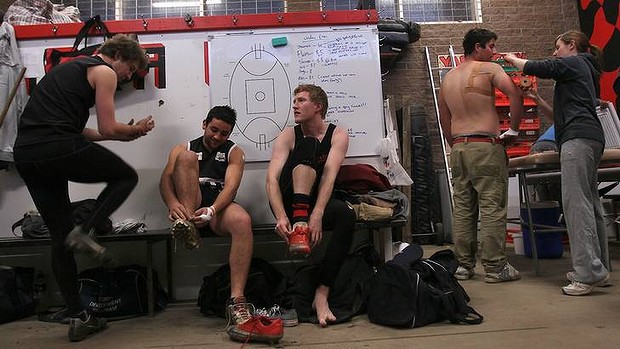SOMETIMES he’d say he had a girlfriend. In the world of Aussie rules football, Jason Ball thought he had to play up his ”blokeyness”. When teammates sledged opposition players, calling them ”homo” or ”fag”, he’d pretend not to care. Inside the footy club where he’d played since he was five, nobody knew he was gay.
“It was the one place I never thought I’d be able to come out. Ever. It just felt like a really hostile environment. I worried I’d be bullied, maybe I’d get kicked out of the side, maybe the opposition would treat me differently or I’d get abuse [from supporters] over the fence,” he told The Sunday Age. “I didn’t know any footballers who were gay, so I could only assume the worst, and it scared me.”
The 24-year-old, who plays for Yarra Glen seniors in the Yarra Valley Mountain District Football League, is a rare voice in a football world that gay groups say is struggling to come to terms with homosexuality in its ranks.
While such groups agree sexuality is a private matter, they say it is significant that no AFL players have revealed their homosexuality.
For Ball, publicly coming out was unnecessary. His teammates figured it out and were supportive. The homophobic language stopped. ”It was like they could see those words have an effect on people because it was hurting me, one of their mates.”
Ball believes there are hundreds, maybe thousands of others like him playing in minor leagues, and professionally, who feel too isolated to reveal their sexuality. There are rumours that a TV network has offered a gay AFL player a six-figure sum to be the first footballer to come out.
Today, backed by online-petition movement Change.org, Ball will launch a campaign urging the league to air anti-homophobia videos at the MCG during this month’s grand final. He also wants the AFL to stage a ”Pride” round next season to celebrate sexual diversity.
Beyondblue chairman Jeff Kennett, who last week launched a campaign highlighting the mental health impact of homophobia, backed Ball’s petition. He told The Sunday Age he spoke privately with AFL boss Andrew Demetriou last week, urging him to do more to tackle the problem in the game.
”Beyondblue has a relationship with the AFL anyway, and Andrew and I have been discussing some ideas that have not been done before for next year, which will be about sexuality discrimination,” Mr Kennett said. ”This young man really deserves to be congratulated because there will be many of his fellow footballers who are in exactly the same position but have been worried about public pressure and therefore kept their sexuality to themselves.”
It comes after the AFL last month wrote a letter of support for ”No to Homophobia” – a campaign run by gay rights and social justice groups – but were criticised for not doing more.
The fact St Kilda’s Stephen Milne escaped with a $3000 fine and an education course rather than a suspension, after calling Collingwood defender Harry O’Brien a ”f—ing homo”, implied that sexual vilification was treated less seriously than other forms of discrimination, Ball said.
”At high school I got picked on for being gay and those words were used to make me feel small and worthless. If you look at rates of suicide, self-harm and depression for gay kids, this is a serious issue. I was fine coming out to my school friends and my family but I was terrified coming out to my football team. That makes it the AFL’s problem because this culture is in their sport.”
Some have questioned whether the AFL should be responsible for taking a lead role on every major social issue.
But Ball argues that as long as our cultural life is viewed through the prism of football, the AFL has a greater role to play than most in ”changing hearts and minds”.
”It’s no wonder that no gay player at a professional level would come out when the AFL is not working as it could to create a more positive and inclusive environment for that to happen. I think the players are ready. The clubs are ready. But we just need the AFL to lead on changing the culture so that players and fans like me can openly be who we are without fear.”
Dr Caroline Symons, a senior lecturer in social policy in sport at Victoria University, says a 2010 report she co-authored surveying the gay and lesbian community found football was the hardest sport for people to be open about their sexuality.
”If you weren’t playing well the terms used to motivate men were, ‘You’re playing like a pack of poofs or faggots.’ So the terminology associates being gay with being weak and that can be very alienating,” she said.
A spokesman for the AFL said it supported diversity and respectful relationships and did not tolerate discrimination.
The Australian Christian Lobby has rejected Jeff Kennett’s offer to replace the Prime Minister at its national conference. On Thursday, Julia Gillard withdrew from the October conference, citing ”offensive” comments by the lobby’s leader, Jim Wallace, on homosexuality.
Read more: http://www.theage.com.au/afl/afl-news/i-didnt-know-any-footballers-who-were-gay-20120908-25ler.html#ixzz276ZqSADA


